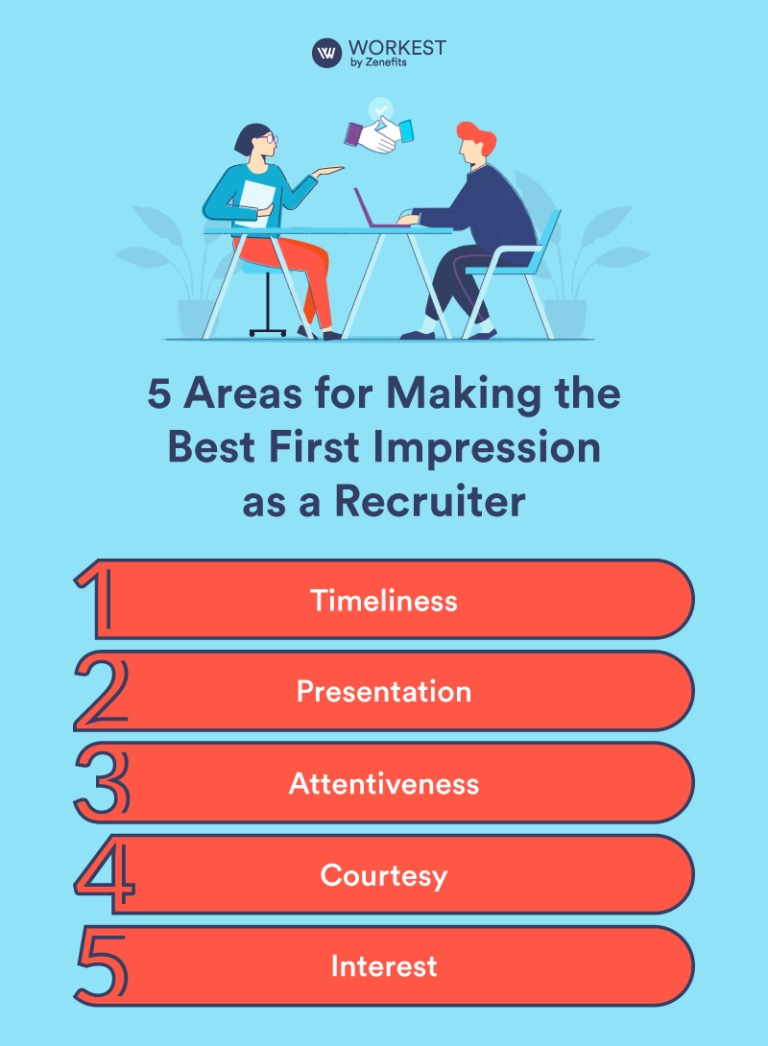
Table of contents
- 1.Timeliness
- 2.Presentation
- 3.Attentiveness
- 4.Courtesy
- 5.Interest
As a recruiter or hiring manager, you have something they want — a job. Your focus may be more on the impression a candidate makes on you, rather than the one you make on them. As the war for talent reaches DEFCON 3 you might want to consider if you’re putting your best foot forward when interviewing. Applicants know the basics of the job when they submit their resume. When the interview process begins, they’re assessing everything to determine whether or not this is somewhere they want to work or to avoid. Everything you do is being evaluated: every location you show them is being appraised. If you’re not selling yourself, the job and your company to the applicant you may be wasting everyone’s time. Applicants don’t convert to new hires when the interview process is slow, disrespectful or indifferent. If you want to score top talent, here are 5 areas you can make the best first impression. 

Timeliness
Nothing says you’re unimportant more than making someone wait for their scheduled interview. If you set the time at 11 am, be in the hallway ushering them into your office at 10:59. They may be currently unemployed, but their time is as valuable as yours — they could be spending it interviewing somewhere else. Being on time is a sign of social respect, but it also sends a message about your business. Is your company so busy recruiters can’t meet their own schedule? That may translate as a company with high turnover. Is the organization disorganized? Few people want to work in a chaotic company. Being on time is more than a courtesy; it’s an indicator that you’re a great place to work, or a train wreck.Presentation
Some people work well in clutter, but it’s not something recruiters should be showing the job-seeking public.Of course you’re dressed professionally, but are you presentable? Applicants are taking it all in to verify you’re the place they want to land. Make sure it’s easy for them to find your offices and there’s a comfortable place for them to wait until their scheduled interview. Bonus points if you offer a cup of coffee or a water while they wait. If a flame thrower would improve the look of your desk, you’re making a bad first impression. Some people work well in clutter, but it’s not something recruiters should be showing the job-seeking public. Piles of files suggest you’re either overworked (would you want to work here?) or the company is a revolving door of new hires. If your office looks like a cramped former utility closet, they’ll see the value the organization puts on its employee’s comfort. If the whole place is a mess, they’ll be cutting the interview short. You don’t want to misrepresent the company, but it’s best to avoid taking an applicant on tours of the facility where it looks like a cyclone just came through — and clean that up!
Attentiveness
No matter how tight or open the talent market is, you’ll want every candidate to believe you’re listening carefully to what they have to say. Interviews are uncomfortable for most people. Pay attention to their body language — if it seems they’re fidgety or nervous, try to lighten the conversation with a bit of humor. Even if you use a structured interview format, be conscious of the signals they project. Work to ease their comfort level and you might get a more revealing interview. Cell phone off, calls forwarded, screen saver enacted. If you’re typically barged-in-upon, post a "meeting in progress, do not disturb" sign on your door. You’ve promised them your time and attention: make sure it’s undivided.Courtesy
How you treat the candidate makes a good first impression or sends them running. There are touch points along the recruitment process that make or break candidate experience, such as thanking them for:- Their resume
- For taking time to talk during a prescreen
- Scheduling (and showing up!) for the interview
Bonus points to recruiters who follow up after the interview with an email or text thanking candidates again for their time. Extra bonus points if you can personalize your thank you with a bit of professional detail you learned about them.
Interest
We all roll our eyes at the scripted "we know you have a lot of choices in service providers, and we appreciate you being a loyal customer." But that’s exactly the sentiment you want to convey. It’s a tight market out there — there are dozens of other companies they could be interviewing with. Your level of interest could mean they choose yours. The days of the offhand "we’ll be in touch" interview wrap-up are long gone. You’re interested in hiring, act like it. Interject often when they discuss their background with ‘that’s exactly what we’re looking for’ or ‘that experience could translate well to our role’ comments. Capitalize on their interest, as well. Take their questions seriously and answer them honestly. The object is to get everyone excited about them joining the company – your role in achieving that is as important as theirs. Want to really pique their interest? Wrap up the interview with a timeline on how long it will take you to make an offer (and stick with it) and "how soon could you start once we make a decision?" Bonus points to recruiters who follow up after the interview to let them know you’re anxious for them to join your team. First impressions may seem like a superficial category, but there’s a reason people rely on them. Forbes reported our conscious mind manages about 40 bits of information per second: unconsciously we’re managing 11 million per second. We’re hardwired to gather first impressions — friend or foe, for example — to keep ourselves from being overwhelmed with information. And when we make those quick assessments, we know how to proceed — accept that offer or refuse it — from the person we encounter. First impressions matter in everything we do, but for recruiters, the impressions you send are as much about your company as they are about yourself. The key is to look at the entire hiring process from a candidate’s point of view. What are the impressions you’re making at every encounter along the way? You’ll want each connection to sell the candidate on your position - not repel them.This article is for informational purposes only, is not legal, tax or accounting advice, and is not an offer to sell, buy or procure insurance. It may contain links to third-party sites or information for reference only. Inclusion does not imply TriNet’s endorsement of or responsibility for third-party content.

TriNet Team
Best practices from our HR experts
Table of contents
- 1.Timeliness
- 2.Presentation
- 3.Attentiveness
- 4.Courtesy
- 5.Interest


